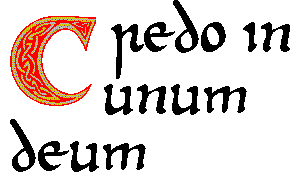 One of the benefits (maybe the only benefit) of the Da Vinci Code is an interest in the creeds that the church has used.
One of the benefits (maybe the only benefit) of the Da Vinci Code is an interest in the creeds that the church has used. I confess, that I have not used the creeds a lot... but I do believe they can help us connect historically with the larger church. And even for us non-creedal people, there are some things here that are helpful.
Creed \'kreed[ME crede, from OE creeda, from Latin credo ("I believe" the first word of the Apostles' and Nicene creeds), from credere to believe, trust, entrust; akin to OIr cretid "he believes"]Creeds
1: a brief authoritative formula of religious belief
2: a set of fundamental beliefs
3: a guiding principle
# are not additions to Scripture
# replacements for the words of Jesus or the NT authors
Creeds are statements of faith that attempt to reflect what Scripture teaches.
Some will say that creeds are man made and so we should ignore them and simply lean on the Bible. By extension, that would mean that we should get rid of all sermons, Bible study materials, commentaries, and theological books.
Yes, it is the Bible which is "the only infallible rule of faith and practice." But the creeds are a reflection of how God's Spirit has spoken to the Church over the years as they have struggled with various issues.
C. H. Spurgeon said to his students,
"you are not such wiseacres as to think or say that you can expound the Scripture without the assistance from the works of divine and learned men who have labored before you in the field of exposition... It seems odd that certain men who talk so much of what the Holy Spirit reveals to themselves, should think so little of what he has revealed to others." (Commenting and Commentaries)Check some of the Creeds of Christendom.
Thanks to Michael H. Anderson for putting this together.
No comments:
Post a Comment